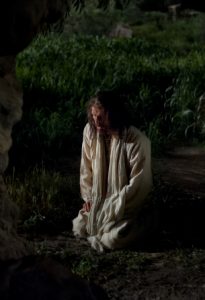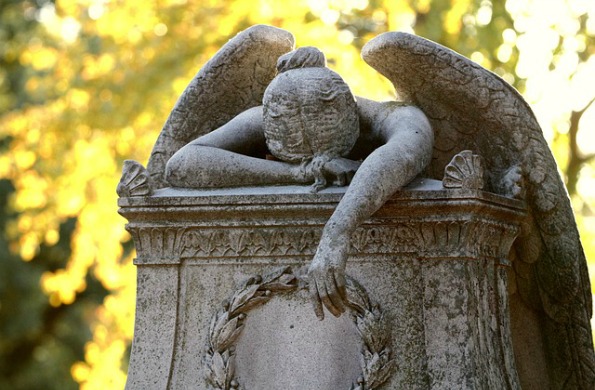When John the Baptist died, Jesus left on a ship to a “desert place apart” (Matthew 14:13). He sought time and space to mourn a friend. Yet he was followed by a large group of people. When he saw them he healed their sick and taught them all day long. At evening He had five loaves and two fishes. He blessed them and broke them and fed more than 5,000 people with food remaining.
Then “Straightway Jesus constrained his disciples to get into a ship, and to go before him unto the other side, while he sent the multitudes away and when he had sent the multitudes away, he went up into a mountain apart to pray; and when evening was come, he was there alone.” (Matthew 14: 22-23) He stayed there until just before 3 in the morning when he walked out to meet the boat.
What can we learn about mourning from how Jesus mourned?

Jesus felt all our grief.
Jesus mourned. He sought time and space with his disciples and alone to mourn. After His service, perhaps a wave of more intense mourning had hit him. Although He had brought His disciples originally to His place apart, He now needed time alone and He was willing to “constrain” them to leave and walk on water to get it.
He stayed alone for hours and hours.
Mourning will frequently be interrupted, even by good things.
Jesus was able to do great things even in mourning. He still could teach and perform miracles and go about His normal responsibilities some of the time. He was still in mourning and when it hit he responded immediately to take the time He needed.
Everyone mourns differently. Some people scarcely cry. Some seem to go along living in their new normal. Some people struggle to get out of bed and go along in a bubble trying in vain to feel anything but numb. Sometimes people alternate between the two states in some sort of bipolar wave. Sometimes the change from functioning to non functioning is slow and sometimes it attacks, causing emotional whiplash. Even as time passes sometimes grief still overtakes on anniversaries or holidays and sometimes it ambushes us.
None of those states are more faithful or less faithful. Dry eyes and a happy face do not mean someone is more faithful. Desperate heart wrenching sobs do not mean someone is less faithful.
Grief and faith

Dry eyes and a happy face do not mean someone is more faithful.
A faithful grieving period is one in which someone can still remember at some point to turn to God. Sometimes that turn is not with love and a heart of peace. Sometimes we cry in anger. Hasn’t Jesus asked “My God, My God why hast thou forsaken me?” He wasn’t faithless. God is the all powerful creator of the universe. He can handle questioning and anger. He can handle lots of tears. He can handle confused mumbling or weeks of prayers without mentioning anything deep or meaningful. He will patiently wait with you and for you.
Enduring to the end well is not without tears and frustrations and staying in bed and quesadillas for dinner and laundry undone. It is turning to God. Someone who gets dressed and goes through their day is not enduring better than someone who is currently crippled by grief. We do not measure faith or love or strength by the lack or the quantity of tears. Everyone is different. Let yourself and others BE.
This can be hard with those closest to us. Perhaps this is why Jesus, in the end, sought to grieve alone. He let the disciples grieve their way and He, His way. The Savior of the world didn’t tell them to grieve like Him. The feelings He felt were not more perfect…how He reacted to and honored those feelings…that is how He was perfect.
Maybe in our mourning all others have to offer us is a paltry 5 loaves and 2 fishes. We know the needs and the responsibilities we have. We are overwhelmed by them. In that instance, I don’t feel the Lord means them to be the miracle and somehow feed the 5,000. He can take that small offering and bless it and make it enough. Perhaps what others have to offer us feels more poisonous. Jesus constrained his own disciples to leave. Perhaps something in their own lives makes it impossible for them in that moment to mourn with us and love like we so desperately need. Try to not cling to that. Know that Jesus’ grace is sufficient in this moment.
How did Jesus mourn with those that mourn?
Jesus heard that Lazarus was sick, “When Jesus heard that, he said, This sickness is not unto death, but for the glory of God, that the Son of God might be glorified thereby. Now Jesus loved Martha, and her sister, and Lazarus. When he had heard therefore that he was sick, he abode two days still in the same place where he was. Then after that saith he to his disciples, Let us go into Judea again. His disciples say unto him, Master, the Jews of late sought to stone thee, and goest thou thither again? [here he reminds the disciples that His days are numbered and won’t be less, so He will do what He needs to do, no matter the danger. He then talks about Lazarus and that he is sleeping, by which He means death but the disciples misunderstand.]

Mary, Martha and Lazarus
Then when Jesus came, he found that he had lain in the grave four days already…Then Martha, as soon as she heard that Jesus was coming, went and met him; but Mary sat still in the house. Then said Martha unto Jesus, Lord, if thou hadst been here, my brother had not died. But I know, that even now whatsoever thou wilt ask of God, God will give it thee. Jesus saith unto her thy brother shall rise again… [Jesus continued to travel toward the town, Martha had apparently come quite a ways, Mary was called and came ]
“When Mary was come where Jesus was, and saw him, she fell down at his feet, saying unto him, Lord, if thou hadst been here, my brother had not died. When Jesus therefore saw her weeping, and the Jews also weeping which came with her, he groaned in the spirit, and was troubled. And said, Where have ye laid him? They said unto him, Lord come and see. Jesus wept”. John 11:4-35
Mary and Martha mourn very differently. Mary is home receiving visitors and mourning. Martha is mourning in her own way, which includes the ability to run to Jesus. Both question why Jesus didn’t save Lazarus before he died. One follows that with a faithful statement, one falls and weeps.
Unlike earlier in their home when he chided one sister and asked her to be like the other (Luke 10:41), in this case…he stayed silent, then cried with them. He didn’t correct them, He didn’t call either faithless, He didn’t call them to repentance when they questioned His timing, He didn’t remind them that because of Him they could see Lazarus again, He didn’t preach or teach or fix anything. He could and would raise Lazarus from the dead, he had healed all manner of physical and mental illness, but when it came to mourning he didn’t heal or fix. He wept. He wasn’t there to just raise Lazarus from the dead, He was there to save all mankind, including Mary and Martha.
Stop Judging those who are mourning
This is a plea. Please. Don’t judge yourself or others in mourning. Let others weep and weep with them. Be silent. It is uncomfortable to watch others struggle and cry and suffer. Call on God’s strength and grace that you can mourn with them. Don’t try to fix or heal them from their grief. Love them where they are. Yes families are forever, yes we will see all those who die. Yes Christ was resurrected and His grace has power. Yes the person who has died is no longer feeling pain.

To read all of Britt Kelly’s articles, please click here.
Yes this is a plan of happiness and we are to have joy. Yet Jesus groaned and was troubled and wept. It wasn’t a failing on His part. It was a unique expression of eternal love. Mourning is love. However we express or feel our mourning is a part of that love. A painful reminder of how homesick we are for heaven. A longing for those we love is a longing for heaven. That is faithful.
If you are worried about the faith of others in their mourning, let God handle that.
About Britt Kelly
Britt grew up in a family of six brothers and one sister and gained a bonus sister later. She camped in the High Sierras, canoed down the Colorado, and played volleyball at Brigham Young University. She then served a mission to South Africa.
With all of her time in the gym and the mountains and South Africa, she was totally prepared to become the mother of 2 sons and soon to be 9 daughters. By totally prepared she means willing to love them and muddle through everything else in a partially sleepless state. She is mostly successful at figuring out how to keep the baby clothed, or at least diapered, though her current toddler is challenging this skill.
She feels children naturally love to learn and didn’t want to disrupt childhood curiosity with worksheets and school bells. She loves to play in the dirt, read books, go on adventures, watch her children discover new things, and mentor her children. Her oldest child is currently at a community college and her oldest son is going to high school at a public school. She loves to follow her children in their unique paths and interests.
She loves to write because, unlike the laundry and the dishes, writing stays done. Whenever someone asks her how she does it all she wonders what in the world they think she’s doing.
Twitter •






